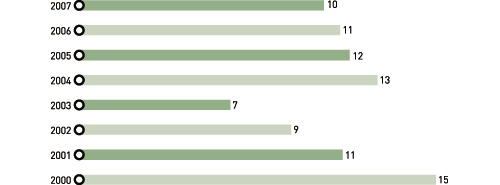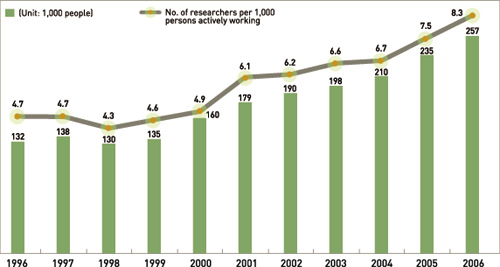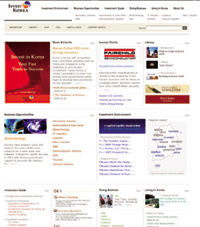In the case of Korea, foreign trade accounted for 71.5% of the national GDP in 2006, while revenue from foreign invested companies took up almost 14% of total manufacturing sales. As such, Korea is working hard to support foreign invested companies. A good example is the opening of the world's largest LCD complex in Paju, just kilometers from the Demilitarized Zone.
The Government built roads and infrastructure needed to support the massive industrial complex in Paju. It worked to relax or eliminate regulations that had been in place for decades regarding the development of border areas. These and other measures were pushed through with utmost speed -- a sign of the Government's willingness and commitment to helping foreign businesses take root in Korea.

President Lee Myung-bak at the Asian Leadership Conference in Seoul
There are many other success stories: The British retailer Tesco has done remarkably well in Korea. Tesco's Korean operations make up a third of the retailer's overseas sales. Another example is the outstanding performance by GM Daewoo. The company, in the first quarter of 2006, became Korea's number two automaker once again. It has made great strides in the span of just four years. GM Daewoo is doing so well, in fact, that it is said to be helping to boost GM's overall presence in Asia.
Korea is expecting US$10 billion in foreign investment in 2008 ― a level similar to 2007. In addition to the usual sectors like finance and insurance, there is growing interest by investors in R&D facilities, logistics centers and regional headquarters of multinational corporations. There is also much interest in Korea's highly developed electronics sector from parts and materials companies.
The interest expressed by investors in these fields is natural when you consider the huge R&D investments made by Korea annually, helping it to rank in the top 10 every year. Such dedication has paid off in many fields. In 2006, Korea was ranked fourth in terms of international patent applications filed with the World Intellectual Property Organization (WIPO).
* Foreign Direct Investment (FDI) [Unit: US$ billion]

* Source: Ministry of Knowledge Economy
One of Korea's strong points is its great human resources. There are more than 100,000 science and engineering students graduating every year. An increasing number of these students are working for master's and doctorate degrees. For investors, this is the optimal environment for creating new goods and services. Another point to consider is that Korea is the perfect place to base logistics centers or regional headquarters in Asia. There are 51 cities with populations of one million or more within a four-hour flight from Seoul.
Besides Korea's potential as a hub of Asia, Korea has another advantage in that companies can easily expand to overseas markets after using Korea as a test bed platform. Already more than half of the Fortune 500 companies have a presence in Korea.
* Number of Researchers 
* Source: Ministry of Education, Sience and Technology

Invest KOREA (IK), Korea's national investment promotion agency, was established within the Korea Trade-Investment Promotion Agency (KOTRA) with the sole purpose of supporting the entry and successful establishment of foreign business into Korea. For more information about Invest Korea, go to www.investkorea.org.
Underscoring the importance of investment to the nation's future, Korea is determined to do all it can to accommodate investor needs. For this, Korea is implementing measures to help improve the business environment. The new Invest Korea Plaza in southern Seoul opened in late 2006 to help foreign-backed businesses meld seamlessly with the Korean economy. The facility will offer many programs geared toward potential investors, the most important of which will be the hands-on consultations and incubating assistance for businesses about to start operations in Korea.
The Plaza is a one-stop service destination for investors: on-site project managers help with everything from finding the best location for factory sites, to dealing with administrative details, to applying for all relevant government assistance programs and benefits. The Government is working to increase incentives so that businesses interested in high-tech R&D or those wishing to relocate their regional headquarters to Korea will have greater access to cash grants.
Ultimately, Korea is concentrating efforts on two objectives: first, supporting market conditions which allow entrepreneurs to fully realize their business potential and, secondly, following through on its commitment to help businesses perform well here.